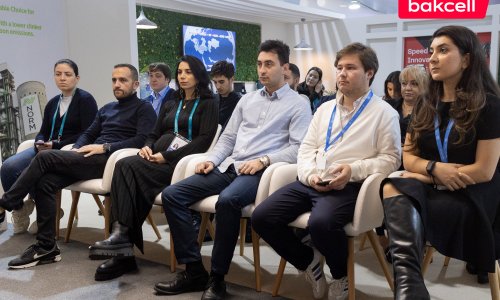Follow us !
Internet gains are serendipity's loss
Society
12:15 | 21.11.2013

Internet gains are serendipity's loss
Chris Haufe is tired of Amazon's recommendations."I'd say about 95% of the time Amazon suggests a book to me, it's one I already have," he says.This is not due to a lack of interest on the part of Haufe, a professor at Case Western University who specializes in the history and philosophy of science. He'd still like some interesting, perhaps off-the-wall suggestions.But Amazon's vaunted algorithm, embodied in the recommendations page of "Your Amazon.com" and the "customers who bought this item also bought" line on each product page, doesn't cast a net wide enough for Haufe's consideration.In that, he sees a bigger concern. Our reliance on computer algorithms, he observes, may be narrowing our choices. They're taking serendipity -- the random, happy accidents of life -- out of the mix."We're losing something vital to the production of knowledge," he says.It's kind of surprising, actually. The Internet is a gigantic ball of randomness, an entire universe of human understanding -- whether it's Wikipedia entries, scholarly articles, YouTube videos, social media memes or everything in between. When we talk about "surfing the Internet," we're often describing a session of jumping from site to site and link to link with little connection besides our own curiosity. Jorge Luis Borges would be thrilled.On the other hand, in trying to reduce that knowledge to bite-sized morsels, we risk lowering the possibility of serendipity. Digital tools come equipped with sophisticated algorithms catering to our personalities, our pasts, our expectations -- and we don't necessarily seek out something new and different.Enter a musical starting point into Pandora, for instance, and you get songs, or artists, similar to the one you began with. A search term in Google may produce dozens of results, but we seldom click past the first page, which has the most popular (and usually obvious) suggestions. Siri is helpful, even entertaining, but not particularly surprising.This is all well and good (and darned convenient, too), but is something missing?Haufe wonders."One of the really unfortunate effects (of algorithms) is that people are not forced to think about things that they wouldn't normally think about, with everything designed exactly the way you would ideally like it to be," he says. "It really kind of puts the brain to sleep."Predictability vs. noveltyThe issue gets back to the old divide between predictability and novelty.On the one hand, we like comfort zones and convenience. We stick with certain products and, especially in the Internet age, want our choices quickly and efficiently. Long before computers ruled, we set up systems to provide the expected.Consider Top 40 radio -- born out of an observation that people like to hear the same songs over and over -- and fast-food chains, known for their strict quality controls.Today, the wealth of data provided by the Internet can make those choices even easier. Businesses, media organizations and advertisers love Big Data, which lets them target consumers more accurately.Jacqueline Corbelli, the founder and CEO of BrightLine, a marketing company that creates targeted television advertising, believes the Internet age has made for more engaging, personalized content."People don't want to be talked at and advertised to, but what they do respond to is relevant communication that is not blatantly advertising," she says. Yes, the sharing of data raises privacy issues, but "what you're finding is that people want a personalized experience. If I'm going to be advertised to, at least it's stuff I'm actually interested in and I want to know about."However, there are times when the unexpected pays huge dividends, whether it's taking a chance on a new dish, reading a new author or simply getting lost.This divide is something artificial intelligence experts have considered for years, says Tim Tuttle, the CEO and founder of Expect Labs, a San Francisco-based firm specializing in anticipatory technology.We're continuing to move toward a world where we can surround ourselves with only the information we care about, he observes, and "the systems that we use will learn what we like and feed it to us 24 hours a day." There's no escaping that, he continues, and we'll have to adjust. Indeed, Expect Labs' cornerstone product, due out soon, is called MindMeld, a voice-recognition iPad app that monitors conversations to "streamline information discovery," its website says.But, Tuttle adds, we're not in that world yet, and he suspects that inventors will continue to refine systems to add the unexpected."Ten years from now, 15 years from now, we might look back and we'll realize that there's a downside of only giving people just the information they care about, and I suspect we'll learn to make these systems so they can surprise you every now and then," the MIT and Bell Labs veteran says. "But the field isn't there yet."Division and groupthinkIn the meantime, tech thinkers have raised the alarm of living in our own cyberworlds. Eli Pariser, in his book "The Filter Bubble," worried that the Internet was dividing us by interests."The algorithms that orchestrate our ads are starting to orchestrate our lives," he says in a TED talk.In addition, Haufe points out, common online results can turn into groupthink."I would say that the biggest problem with this stuff is not the loss of serendipity but the accelerated rate of convergence of beliefs," he says.For example, Google has made out-of-copyright books available free online. In one study, he says, more than 70% of a large class cited the same secondary source from the early 20th century -- and nothing contemporary. That's because, says Haufe, "they could download this secondary source from Google Books, and didn't have to go to the library to get secondary source material."Similarly, in another, much-debated study, analysts tested a hypothesis that electronically posted work would broaden science. Instead, the study showed "exactly the opposite," Haufe says -- more convergences. He compares it to a Google feedback loop: The more times something was viewed on Google, the more likely it was to pop up in a search, and the more it popped up in a search, the more likely it was to be viewed."So you have this feedback loop that results in a rapid destruction of alternative views," he says.'Another turn of the wheel'The fact is, though, that the Internet has also allowed for the kind of broad communication that's never existed before. Hand-wringing about technology producing a loss of randomness is really an immersion in nostalgia, says Robert Weiss, the author of the forthcoming "Closer Together, Further Apart: The Effect of Technology and the Internet on Sex, Intimacy and Relationships.""It's just another turn of the wheel," says Weiss, a social worker and executive at Elements Behavioral Health.He points out that a previous generation worried that television was going to ruin the family by pulling people away from the dinner table to watch the tube in silence; years later, in an age of being attached to individual screens, the TV age was rewritten to suggest family closeness.So the Internet is narrowing choice and closing doors? Far from it, says Weiss. It's actually opening them -- which opens up more opportunities for those willing to walk through, he says."What technology has done is replace something we have taken away in the 20th century -- community," he says. The postwar era saw the breakdown of extended families and tight-knit neighborhoods, but thanks to the Internet and the devices that use it, "we have created this ability to connect with people and create community. We can find large groups of people who share interests, and we don't have to take time to go searching for something that we might not even find."Moreover, many sites and apps allow us to make sense of randomness in a way we couldn't before, he adds. Take Shazam, the popular music identification app. In the pre-smartphone age, you could hear a random song and never know what it was -- it was there and gone. Now one click of Shazam and you can not only find out what it is, but also make it yours.We're still getting used to these new paths, Weiss says."The older generation always (puts down) younger people's new technologies because we're afraid of being left behind," he says.'A real loss'?Things haven't really changed that much, Weiss adds. For example, he says, a previous generation listened to the radio by spinning a dial to find stations, with favorites marked by buttons. The process is different now -- digitally scanned dials, Internet services, Bluetooth apps -- but we still listen to the radio.But Doug Cannon, a philosophy professor at the University of Puget Sound, sees the radio metaphor differently. That dial twiddling allowed us to find things we may have overlooked. Similarly, we now have access to countless headlines on news sites, but because of their structure, people generally stick with a handful -- those "above the fold" -- unlike reading a newspaper, where the large medium encourages readers to scan an assortment and turn pages for more.Tuning out the unexpected is like being blindly guided by a GPS, he says. You lose the sense of where you are."To have (computers) substitute for our sensory capacities, and for our memories, and for our having the opportunity for random encounters and unexpected stimuli, seems to me to be a real loss," he says.Of course, as Expect Labs' Tuttle points out, we're not there yet. And smart researchers recognize that, even at our most predictable, we're not entirely predictable."All the investments we make to try to -- almost -- engineer serendipity don't really work because of a thing the academics call causal ambiguity. Even the most well done social science research can't explain how and why some outcomes occur in some situations," says Rita McGrath, a professor at Columbia University's business school. "So even our most laudable attempts to game the system for the outcomes we want often miss the mark."It helps to remember that the Internet and related technology, even with all their capabilities, remain tools, says Tuttle. As with automation throughout the centuries, the idea is to free our bodies -- and our minds -- to focus on other things."If you can automate mundane tasks, that gives people the time to really be creative and to work on the interesting things they don't have time to do," he says.The key, says Weiss, is simply being open to the randomness that does present itself."We still walk in the world," he says. "If there's a problem, we're the problem."(CNN)ANN.Az










